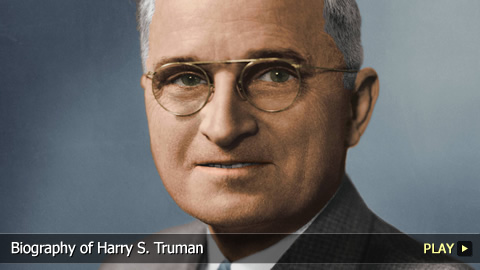Biography of Harry S. Truman: Atomic Bombs, Communism, Korean War

- Early Life
- Military Service and Freemasonry
- A Born Leader
- Failed Business
- Launch of Political Career
- Early Years in Politics
- Higher Profile
- VP Candidate for FDR
- The Unexpected President
- Nuclear Bombs
- Truman Doctrine and Communism in Europe
- Fair Deal
- Reelection and NATO
- McCarthy Era Red Scare
- The Korean War
- Approval Ratings
- Later Years and Death
- Legacy
Early Life
Harry S. Truman was born May 8th, 1884 in Lamar, Missouri. As a child, he cultivated interests in music, history and reading. After graduating high school in 1901, he was unable to attend university because of poor eyesight.
Military Service and Freemasonry
Instead, he worked odd jobs before enlisting in the army in 1905. He served until 1911, and during this period he also became a Freemason.
A Born Leader
Truman began managing his family’s farm in 1914 following his father’s death, but after a few years he rejoined the army. Truman’s World War I experience as a successful and well-admired captain emphasized his skills as a leader.
Failed Business
He returned to Missouri after the war and married his longtime girlfriend Bess Wallace in June 1919. Around that time, he and army friend Edward Jacobson opened a clothing store in Kansas City; however, it failed during 1921’s recession.
Launch of Political Career
Truman began his political career in 1922 as a County Court judge with help from Democratic bigwig Tom Pendergast, who was the uncle of one of Truman’s army buddies.
Early Years in Politics
Truman eventually spent eight years as the court’s presiding judge. During that time, he modified the city’s infrastructure by enacting a “Ten Year Plan.” Truman followed this by running for U.S. Senate. He handily won the election, but was considered Pendergast’s pawn. However, Truman’s integrity and affability gained him support among his fellow politicians.
Higher Profile
Truman rose to national prominence during his second term because of the Truman Committee, which helped save money and lives during World War II.
VP Candidate for FDR
In 1944, Truman was selected as Franklin Roosevelt’s new vice presidential candidate. The pair won easily; however, Truman only served 82 days as VP. On April 12th, 1945, Roosevelt suddenly died.
The Unexpected President
The transition between presidents was relatively seamless. Though he had never been briefed on many issues, Truman quickly became involved in the foundation of the United Nations, and helped negotiate Germany’s unconditional surrender in World War II.
Nuclear Bombs
His most controversial decision came in August 1945 when he approved the use of two atomic bombs on Japan in an effort to end the war.
Truman Doctrine and Communism in Europe
Immediately following the war, communism threatened Europe. On May 12th, 1947, Truman sparked the Cold War when he outlined plans to halt its expansion with his Truman Doctrine. He then founded what later became the Department of Defence, the U.S. Air Force, the CIA and the National Security Council.
“Fair Deal”
Prior to 1948’s election, Truman introduced his bold and highly liberal “Fair Deal” agenda. He also recognized an independent Israel, and made huge cuts to the defence budget. However, voters were tired of the Democrats.
Reelection and NATO
Truman’s tireless campaigning helped him come from behind to win a second term as president. He continued fighting for civil rights at home, and against communism abroad. The U.S. joined other noncommunist countries on April 4th, 1949 to form the North Atlantic Treaty Organization, or NATO, to limit Soviet expansion.
McCarthy Era Red Scare
However, around this time, China fell to the communists and the Soviets built their first nuclear bomb. The U.S. responded in 1953 with the production of a hydrogen bomb. The “Red Scare” spread to the States in the 1950s when Republican Senator Joseph McCarthy accused Truman’s administration of harboring communists.
The Korean War
In June 1950, communist North Korean forces invaded noncommunist South Korea. Truman sent General Douglas MacArthur and U.S. forces to stall the attack. They succeeded, but MacArthur pressed further for a total win over communism. When the U.S. lost ground, MacArthur suggested the use of nuclear force, and this compelled Truman to remove him. The Korean War continued after Truman left the White House, and ultimately caused 33 thousand American deaths.
Approval Ratings
Truman’s inability to quash communism resulted in a 31% approval rating when he left office in January 1953. However, his reputation improved in the years following his presidency.
Later Years and Death
Truman stayed healthy in retirement until the mid-1960s, but on December 26th, 1972 he died of multiple organ failure.
Legacy
His presidency was not without scandal, detractors or assassination attempts. However, Harry S. Truman is remembered as an ordinary man who led his country through a transformative time in history. “Give ‘Em Hell, Harry.”
